Berliner FC Dynamo
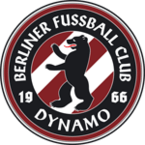 Club logo (2009–) | |||
| Full name | Berliner Fussball Club Dynamo e. V. | ||
|---|---|---|---|
| Nickname(s) | "The Wine Reds" | ||
| Founded | 15 January 1966 | ||
| Ground | Friedrich-Ludwig-Jahn-Sportpark | ||
| Capacity | 19,708 | ||
| Chairman | Norbert Uhlig | ||
| Manager | René Rydlewicz | ||
| League | Regionalliga Nordost (IV) | ||
| 2015–16 | 4th | ||
|
| |||
Berliner FC Dynamo (commonly BFC Dynamo or BFC) is a German football club from Berlin and the record champion of East Germany with ten consecutive championships from 1979 through 1988.
History
Founding and GDR era
A predecessor side to the current-day club was established in 1949 as Sportgemeinde Deutsche Volkspolizei Berlin. In March 1953, this team assumed the place of SC Volkspolizei Potsdam in the DDR-Liga, East Germany's tier two competition. The Potsdam and Berlin sides were later formally merged and after 27 March 1953 played as part of the larger Sportvereinigung Dynamo sports club under the name SG Dynamo Berlin. After a 14th-place result in the 1953–54 season, the team was demoted to the Bezirksliga Berlin (III). The club was again renamed, being christened Sport Club Dynamo Berlin on 1 October 1954.[1]
In 1954, team members of Dynamo Dresden were ordered to leave for the capital to establish a competitive side in Berlin. Some of these team members, including Johannes Matzen, Herbert Schoen and Günter Schröter, were originally from Potsdam and had previously been ordered to leave the region to establish the Dynamo Dresden side in order to replace the popular, but bourgeois, Dresdner SC team in Dresden.
Dynamo Berlin enjoyed some success in the late 1950s and early 1960s with a number of top-three finishes and an East German Cup win in 1959. By 1963, however, their play had fallen off and they had become a lower table side leading to their relegation in 1967.
The club was re-established on 15 January 1966 as Berliner Fußballclub Dynamo (BFC Dynamo) when the football department was disassociated as a football club in a general re-organisation of football in the country. The club returned to first division play after a single season's absence. The side was known as being the favoured team of Erich Mielke, the head of East Germany's Stasi (the secret police).[2]
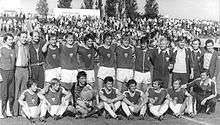
Playing in the DDR-Oberliga BFC won ten consecutive titles from 1979 to 1988 allegedly assisted by obedient referees,[3] and important player transfers from other East German teams. BFC Dynamo was reviled by many East Germans and referee obedience incurred the unofficially expressed displeasure of the country's ruling Politburo. Alleged manipulation of the 1986 championship match between BFC Dynamo and Lokomotive Leipzig which ended in a 1–1 draw led to nationwide protests and resulted in sanctions against referee Bernd Stumpf.[4]
Post-unification
After German re-unification in 1990, the side was renamed FC Berlin in an attempt to re-package it and distance it from its past (Dynamo admitted to tier III of the new German league in 1991–92 season), in 1999, they again took up the name BFC Dynamo. Without its powerful patron and losing its best players to West German Bundesliga teams, the side quickly fell to tier III play and since the 2000–01 season has toiled in IV or V division leagues. The club filed for insolvency in 2001–02 but was required by the German Football Association (DFB) to play out the balance of its games for the season as "mandatory friendlies".
BFC recovered to win the Verbandsliga Berlin (V) championship in 2004 and return to fourth division play in the Oberliga Nordost-Nord (IV, now V) where they settled in as upper-table side.
On 12 June 2013, BFC Dynamo won the Berlin Cup (Berlin Pokal) for a third time, beating SV Lichtenberg 47 1–0, thus qualifying for the national cup of the DFB, the DFB-Pokal.[5] The crowd of 6,381 set a new record for a Berlin Cup final.
The subsequent DFB-Pokal match against VfB Stuttgart took place on 4 August 2013 in front of 9,227 spectators. The stadium capacity of the Friedrich Ludwig Jahn Sportpark had been limited and ticket prices had been increased due to requirements by the DFB. While Dynamo's Christoph Köhne came close after hitting the inner post in the 31st minute, Vedad Ibišević won the game for Stuttgart with goals in the 40th and 75th minutes (a penalty), resulting in a 0–2 defeat.
In the 2013–14 Oberliga season, BFC Dynamo won 15 out of the initial 16 games (while drawing against SV Lichtenberg 47). After 21 season matches, the streak was extended to 20 wins and one draw, effectively securing promotion to Regionalliga Nordost with a 25-point lead.[6] The club subsequently extended contracts with its key players and announced to move back to the Friedrich Ludwig Jahn Sportpark for its Regionalliga matches starting with the 2014–15 season.[7]
Following promotion, BFC Dynamo finished the 2014–15 Regionalliga season in fifth place. During the season, coach Volkan Uluc was replaced by former Hamburger SV player and coach of SSV Jahn Regensburg, Thomas Stratos. Under Stratos, BFC Dynamo secured yet another Berlin Cup trophy, thus qualifying again for the DFB-Pokal. The crowd of 6,914 spectators during the 2015 cup final against Tasmania Berlin (1–0 victory) at the Friedrich Ludwig Jahn Sportpark set another record for a Berlin Cup final.
The 2014–15 season also marked the return of the club to live television with its Regionalliga matches against Carl Zeiss Jena and 1. FC Magdeburg being broadcast by Mitteldeutscher Rundfunk television.
Stadiums
The long-time home and training ground of the club has been the Sportforum Hohenschönhausen. Its outdoor stadium has a capacity of 10,000 spectators, including 2,000 seated, and is part of a large sports complex with facilities for ice hockey, speed skating, athletics, and cycling. When opened it offered the world's first covered indoor speed skating oval. It is also the training ground for the Eisbären Berlin professional ice hockey team, formerly SC Dynamo Berlin. The outdoor stadium was renovated in 2005–06 to include fences and player tunnels.
Dynamo played most European Cup matches and entire seasons (1971–1992) at the Friedrich Ludwig Jahn Sportpark in Prenzlauer Berg, close to the former Berlin Wall. Following the 2014 promotion to Regionalliga Nordost, BFC moved permanently back to the Prenzlauer Berg stadium, next to the Mauerpark.[8] The stadium has a capacity of 19,708 spectators.
The Friedrich-Ludwig-Jahn-Sportpark is currently under planning for a complete redevelopment. The estimated cost for the redevelopment of the whole area is estimated at up to €150 million.[9] The reconstruction could begin in 2018 and be completed by 2023.[10]
Club culture, supporters and rivalries
The Dynamo fans are well known to be in the large majority skinheads, with right-wing and far-right political views. Since the 1970s and '80s, they have been known to have the strongest hooligan element in the country.[11]
The BFC has rivalries with Dynamo Dresden, SV Babelsberg, FSV Zwickau, Berliner AK 07 and Union Berlin while enjoying friendly relations with VfL Bochum and Scottish side Aberdeen,[12] and partially with Eintracht Braunschweig, Polish club Pogoń Szczecin and Swedish club GAIS.
Club crest
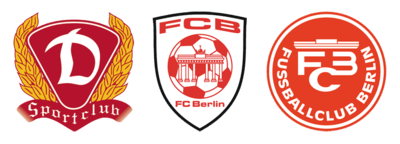
Ownership of the BFC crest
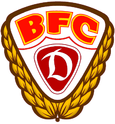
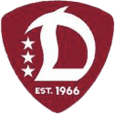
After German re-unification many former East German clubs rushed to drop the names they were often forced to bear during the Communist era and return to traditional names used prior to the end of World War II or to adopt completely new identities. Dynamo was among the clubs to do so, becoming FC Berlin. However, like many others of these clubs they found more value and fan recognition in the names, colours and crests they had played under in East Germany and so returned to these.
Dynamo's situation was complicated as they had neglected to copyright their old crest and found that when they tried to recover it in early 1999 that they no longer held title, having to share it with sports souvenir seller Peter "Pepe" Mager who laid claim to the orphaned image in March 1997. Control of the logo image has since passed to André Sommer and Rayk Bernt and their marketing firm Ra-Be GmbH through which they take ten percent of the value of all fan articles sold. Sommer and Bernt also served as directors in the period following the club's bankruptcy in 2001. This was the cause of additional concern for the beleaguered football association as the pair were known to have links to violent fan groups and the Hells Angels motorcycle club.
The situation has long remained unresolved and Dynamo has been working to recover the rights to its familiar traditional crest. Several alternative crests have been developed and registered in the event that they are unsuccessful in the attempt. The disputed image continued to be used on Dynamo's first team uniforms, at its website, and in other limited contexts, but the club was still unable to fully exploit the commercial value of the logo to its benefit.[13] In 2009, in response to the problem, the club decided to introduce a new logo that abandoned the traditional stylized "D" in favour of the Berlin bear.
Championship stars controversy
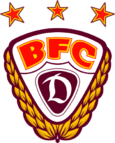
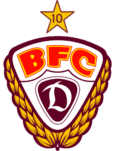
In 2004, the DFB introduced the Verdiente Meistervereine – a system to honor the most successful teams in Bundesliga history awarding one star for three titles, two stars for five, and three stars for ten – allowing qualifying teams to display on their jerseys the stars they have earned. Dynamo Berlin petitioned the league to have their East German titles recognized, but received no reply.[14] They eventually took matters into their own hands and emblazoned their jerseys with three stars. This caused considerable debate on the fact that the DFB did not recognize East German championships, only those championships won since the 1963 formation of the Bundesliga. The issue also affected other former East German teams including Dynamo Dresden (8 titles), Vorwärts Berlin (6), SC Wismut Karl Marx Stadt, Carl Zeiss Jena and 1. FC Magdeburg.
The DFB has since updated this practice by broadening recognition to include all national level men's competitions since 1903 (when the first recognized national championship was staged), including those of the former East Germany, as well as all women's competitions since 1974. In addition, new standards for how championship stars are to be displayed on a team's uniform have been established. The DFB governs the use of championship stars and a club must have that governing body's approval before displaying any such badge.
Dynamo has since occasionally used the championship star in accordance with DFB graphic standards, displaying a star bearing the number 10 in the current website design.
Coaches
|
1954–1973
|
1977–2003
|
2004–
|
Honours
Dynamo Berlin was East Germany's most successful club, capturing ten national titles, and is second in the country only to Bayern Munich, who have 25 national titles to their credit. Those ten titles came consecutively – a feat no other team in Germany has matched at the top level of competition.
- DDR-Oberliga: 10 (Record)
- FDGB-Pokal: 2
- DFV-Supercup: 1
- Winners 1989
- Berlin Cup: 4
- Winners 1999, 2011, 2013, 2015
- Runners-up 2000
- DDR-Liga: 1
- Winners 1967/68
- NOFV-Oberliga Nord: 3
- Verbandsliga Berlin: 1
- Winners 2004
Seasons since end of GDR
| Year | Division | Level | Position |
| 1991–92 | NOFV-Oberliga Nord | III | 1st |
| 1992–93 | NOFV-Oberliga Nord | III | 4th |
| 1993–94 | NOFV-Oberliga Nord | III | 4th |
| 1994–95 | Regionalliga Nordost | III | 11th |
| 1995–96 | Regionalliga Nordost | III | 13th |
| 1996–97 | Regionalliga Nordost | III | 13th |
| 1997–98 | Regionalliga Nordost | III | 11th |
| 1998–99 | Regionalliga Nordost | III | 8th |
| 1999–2000 | Regionalliga Nordost | III | 17th ↓ |
| 2000–01 | NOFV-Oberliga Nord | IV | 1st |
| 2001–02 | NOFV-Oberliga Nord | IV | 17th ↓ |
| 2002–03 | Verbandsliga Berlin | V | 3rd |
| 2003–04 | Verbandsliga Berlin | V | 1st ↑ |
| 2004–05 | NOFV-Oberliga Nord | IV | 6th |
| 2005–06 | NOFV-Oberliga Nord | IV | 6th |
| 2006–07 | NOFV-Oberliga Nord | IV | 10th |
| 2007–08 | NOFV-Oberliga Nord | IV | 5th |
| 2008–09 | NOFV-Oberliga Nord | V | 2nd |
| 2009–10 | NOFV-Oberliga Nord | V | 2nd |
| 2010–11 | NOFV-Oberliga Nord | V | 7th |
| 2011–12 | NOFV-Oberliga Nord | V | 13th |
| 2012–13 | NOFV-Oberliga Nord | V | 3rd |
| 2013–14 | NOFV-Oberliga Nord | V | 1st ↑ |
| 2014–15 | Regionalliga Nordost | IV | 5th |
| 2015–16 | Regionalliga Nordost | IV | 4th |
BFC Dynamo in European competitions
| Season | Competition | Round | Country | Club | Score |
|---|---|---|---|---|---|
| 1971–72 | Cup Winners' Cup | 1st round | Cardiff City | 1–1, 1–1, 5–6 (p) | |
| 1/8 final | K. Beerschot V.A.C. | 3–1, 3–1 | |||
| quarter-final | Åtvidabergs FF | 2–0, 2–2 | |||
| semi-final | Dynamo Moscow | 1–1, 1–1, 4–1 (p) | |||
| 1972–73 | UEFA Cup | 1st round | Angers | 1–1, 2–1 | |
| 2nd round | Levski Sofia | 3–0, 0–2 | |||
| 1/8 final | Liverpool | 0–0, 1–3 | |||
| 1976–77 | UEFA Cup | 1st round | Shakhtar Donetsk | 0–3, 1–1 | |
| 1978–79 | UEFA Cup | 1st round | Red Star Belgrade | 5–2, 1–4 | |
| 1979–80 | European Cup | 1st round | Ruch Chorzów | 4–1, 0–0 | |
| 1/8 round | Servette | 2–1, 2–2 | |||
| quarter-final | Nottingham Forest | 1–0, 1–3 | |||
| 1980–81 | European Cup | 1st round | APOEL | 3–0, 1–2 | |
| 1/8 final | Baník Ostrava | 0–0, 1–1 | |||
| 1981–82 | European Cup | 1st round | Zürich | 2–0, 1–3 | |
| 1/8 final | Aston Villa | 1–2, 1–0 | |||
| 1982–83 | European Cup | 1st round | Hamburger SV | 1–1, 0–2 | |
| 1983–84 | European Cup | 1st round | Jeunesse Esch | 4–1, 2–0 | |
| 1/8 final | Partizan | 2–0, 0–1 | |||
| quarter-final | Roma | 0–3, 2–1 | |||
| 1984–85 | European Cup | 1st round | Aberdeen | 1–2, 2–1, 5–4 (p) | |
| 1/8 final | Austria Wien | 3–3, 1–2 | |||
| 1985–86 | European Cup | 1st round | Austria Wien | 0–2, 1–2 | |
| 1986–87 | European Cup | 1st round | Örgryte IS | 3–2, 4–1 | |
| 1/8 final | Brøndby | 1–2, 1–1 | |||
| 1987–88 | European Cup | 1st round | Bordeaux | 0–2, 0–2 | |
| 1988–89 | European Cup | 1st round | Werder Bremen | 3–0, 0–5 | |
| 1989–90 | Cup Winners' Cup | 1st round | Valur | 2–1, 2–1 | |
| 1/8 final | Monaco | 0–0, 1–1 | |||
See also
- Verdiente Meistervereine (Recognition system for national football championships in Germany)
References
- ↑ Grüne, Hardy (2001). Vereinslexikon. Kassel: AGON Sportverlag ISBN 3-89784-147-9
- ↑ Stephen Evans (12 July 2014). "The secret police with its own football team". BBC News. Retrieved 13 July 2014.
- ↑ "East Germany's Star Quality in Question". Deutsche Welle. 13 May 2005. Retrieved 18 March 2008.
- ↑ Weinreich, Jens (24 March 2005). "Büttel an der Pfeife" (in German). Berliner Zeitung. Retrieved 2 February 2007.
- ↑ http://www.tagesspiegel.de/sport/berliner-pokal-finale-bfc-dynamo-schlaegt-lichtenberg-1-0/8342096.html Der Tagesspiegel (in German).
- ↑ http://www.diefussballecke.de/liga5_non/index.php Die Fussballecke, retrieved on 12 April 2014 (in German).
- ↑ http://www.morgenpost.de/sport/berlin-sport/article126875461/BFC-Dynamo-in-kleinen-Schritten-heraus-aus-der-Versenkung.html BFC Dynamo in kleinen Schritten heraus aus der Versenkung. Berliner Morgenpost, retrieved on 12 April 2014 (in German).
- ↑ http://www.fupa.net/berichte/bfc-dynamo-zieht-in-jahn-sportpark-um-137303.html
- ↑ Biekler, Sabine; Loy, Thomas (22 January 2015). "Olympia: 150 statt 30 Millionen Euro für Jahn-Sportpark". Der Tagesspiegel (in German). Berlin: Verlag Der Tagesspiegel GmbH. Retrieved 31 October 2015.
- ↑ Aulich, Uwe (2 February 2015). "Jahn-Sportpark wird auch ohne Olympia neu gebaut". Berliner Zeitung (in German). Berlin: Berliner Verlag GmbH. Retrieved 31 October 2015.
- ↑ To My Kibice, Winter 2014 No.4(46) p.38-39
- ↑ "BFC Dynamo". LiberoGuide.com. Retrieved 19 January 2015.
- ↑ http://www.berlinonline.de/berliner-kurier/archiv/.bin/dump.fcgi/2006/0406/sport/0038/index.html (German)
- ↑ East Germany's Star Quality in Question | German Soccer | Deutsche Welle | 13.05.2005
External links
- Official website (German)
- The Abseits Guide to German Soccer
- Facts and Figures (German)
- Dynamo Berlin: The soccer club 'owned' by the Stasi via CNN
Coordinates: 52°32′27″N 13°28′34″E / 52.54083°N 13.47611°E